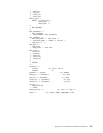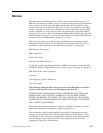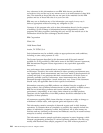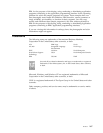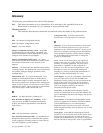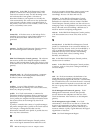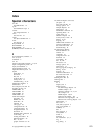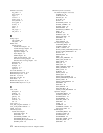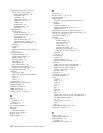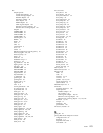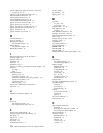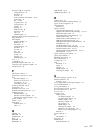event server. In the IBM Tivoli Enterprise Console
product, a central server that processes events. The
event server creates an entry for each incoming event
and evaluates the event against a rule base to
determine whether it can respond to or modify the
event automatically. The event server also updates the
event consoles with the current event information. If
the primary event server is not available, events can be
sent to a secondary event server.
F
format file. A file that serves as the lookup file for
matching log messages to event classes. Moreover, it
serves as the source from which a CDS file is
generated.
G
gateway. See IBM Tivoli Enterprise Console gateway
and Tivoli Management Framework gateway.
I
IBM Tivoli Enterprise Console gateway. The software
that receives events from endpoint adapters, bundles
them up, and forwards them to the event server. It runs
on the same host as the Tivoli Management Framework
gateway.
M
managed node. In a Tivoli environment, a computer
system on which Tivoli Management Framework is
installed. Contrast with endpoint.
P
prefilter. A type of filter defined in an adapter
configuration file for filtering raw events at the source,
before any adapter processing.
profile. In a Tivoli environment, a container for
application-specific information about a particular type
of resource. A Tivoli application specifies the template
for its profiles; the template includes information about
the resources that can be managed by that Tivoli
application.
A profile is created in the context of a profile manager;
the profile manager links a profile to the Tivoli resource
(for example, a managed node) that uses the
information contained in the profile. A profile does not
have any direct subscribers.
R
rule. In the IBM Tivoli Enterprise Console product,
one or more logical statements that enable the event
server to recognize relationships among events (event
correlation) and to execute automated responses
accordingly. Also see rule base and rule set.
rule base. In the IBM Tivoli Enterprise Console
product, one or more rule sets and the event class
definitions for which the rules are written. The IBM
Tivoli Enterprise Console product uses the rule base in
managing events. An organization can create many rule
bases, with each rule base fulfilling a different set of
needs for network computing management.
rule set. In the IBM Tivoli Enterprise Console product,
a file that contains one or more rules. Also see rule
base.
S
severity level. In the IBM Tivoli Enterprise Console
product, a classification for an event that indicates its
degree of severity. Severity levels can be modified by a
user or an IBM Tivoli Enterprise Console rule. The
predefined severity levels, in order of descending
severity, include: fatal, critical, warning, minor,
harmless, and unknown.
slot. In the IBM Tivoli Enterprise Console product,
obsolete term for attribute.
source. In the IBM Tivoli Enterprise Console product,
a resource, such as a host, that is being monitored by
an event adapter.
T
task. In a Tivoli environment, the definition of an
action that must be routinely performed on various
managed nodes throughout the network. A task defines
the executable files to be run when the task is executed,
the authorization role required to execute the task, and
the user or group name under which the task will
execute.
Tivoli Management Framework gateway. Tivoli
Management Framework software that provides
services between the endpoints and the rest of the
Tivoli environment. Also referred to as the endpoint
gateway.
Tivoli management region (TMR). In a Tivoli
environment, a Tivoli server and the set of clients that
it serves. An organization can have more than one
TMR. A TMR addresses the physical connectivity of
resources whereas a policy region addresses the logical
organization of resources.
TMR. See Tivoli Management Region.
170 IBM Tivoli Enterprise Console: Adapters Guide




